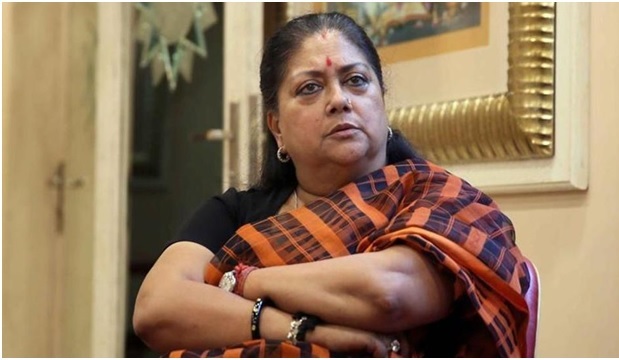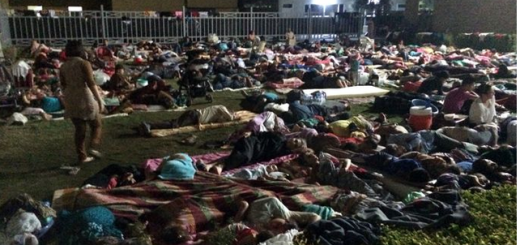Rajasthan Ordinance Disallowing Questioning of State Employees is shameful

Cover Image: The restriction on journalism is Vasundhara Raje’s unique innovation. Maharashtra, which has similar provisions barring investigation/prosecution without sanction, has not imposed upon journalistic freedom (Himanshu Vyas/Hindustan Times)
 (Note: Someone has observed, Modi Sarkar is autocratic, not democractic. It is there for all to see. Modiji seems to have become a trendsetter. All BJP Chief Ministers are following his example now. The best and the worst is Vasundhara Raje, Chief Minister of Rajastan, a dictator par-excellence, also in her looks.
(Note: Someone has observed, Modi Sarkar is autocratic, not democractic. It is there for all to see. Modiji seems to have become a trendsetter. All BJP Chief Ministers are following his example now. The best and the worst is Vasundhara Raje, Chief Minister of Rajastan, a dictator par-excellence, also in her looks.
When Indira Gandhi accused Karunanidi of being an autocratic king in Chennai he retorted, it is because there is an autocratic emperor in Delhi. “Like the leader, so the followers!” This is not the Indian tradition. Even an autocratic Indira was forced to bend her head to a democratic verdict. That must be hastened to happen to the goings on in India now.
Therefore what the columnist Karan Thapar says: “Frankly, what Ms. Scindia has done is shameful. She’s abridged the fundamental freedoms India boasts off. She’s also damaged her party’s claim to uphold and honour India’s vibrant democracy. And, finally, she’s lowered India’s standing in the free world,” is correct. Read more of what he says below. james kottoor, editor ccv).
Karan Thapar
Hindustan Times, Oct 23, 2017
I thought I knew her but I’m starting to believe that Vasundhara Raje Scindia is not the politician I took her to be. The Rajasthan government’s recently revealed Criminal Laws (Rajasthan Amendment) Ordinance, which will shortly be converted into the Code of Criminal Procedure (Rajasthan mendment) Act, is deeply disillusioning. It questions my assumption that the Rajasthan Chief Minister and I share the same respect for press freedom and the same belief that everyone is equal in the eyes of the law.
Vasundhara Raje Scindia has abridged the fundamental freedoms India boasts off. She’s also damaged her party’s claim to uphold and honour India’s vibrant democracy. And, finally, she’s lowered India’s standing in the free world.
The Rajasthan ordinance – which the government hopes to convert into an act during the four-day legislature session which has just started – prohibits investigation without prior sanction against “a judge or a magistrate or a public servant” for any “act done by them while acting or purporting to act in discharge of their official duties”. That sanction can take anything up to six months. Secondly, till sanction is granted, the media cannot report accusations against such persons nor can activists take up the matter. If either do so, they could be jailed for two years.
First of all, this Ordinance ensures that judges, magistrates and public servants are treated differently to you and me if they are accused of corruption or any other criminal act. That is a clear violation of Article 14 of the constitution which declares everyone equal in front of the law. Also, the six months lag before sanction is given could be sufficient for evidence to be diluted, tampered with or even made to disappear. And since an investigating agency cannot verify its suspicions without a proper probe this could also ensure the necessary corroboration to pursue a case is not forthcoming. In effect, this protects public servants accused of corruption not just from prosecution but also investigation.
Arguably worse is the treatment of the media. One of the unquestioned jobs of all journalists and whistle-blowers is to expose venality but now the need for proper prior sanction places iron-clad fetters on the fulfilment of this task. Equally important, this clearly exceeds the restrictions permitted by the constitution under Article 19 (2) on freedom of speech. If legislated into a law the result will be to ban exposure of wrong doing whilst simultaneously undermining executive accountability and keeping the Indian public deliberately in the dark.
The Rajasthan Government justifies all of this on the grounds that its intention is to prevent motivated, frivolous and harassing allegations of corruption which hamper a public servant’s performance and, secondly, to protect their reputation. The government claims this is necessary because 73% of complaints against officers since 2013, when Vasundhara Raje’s government came to office, have not found anyone guilty.
Few if any will dispute that these are desirable objectives but the central question that the Rajasthan government must answer is different: is such draconian action necessary? The Code of Criminal Procedure and Prevention of Corruption Act already make prior sanction necessary. That means these additional fetters are a clear case of overkill. So the second question is will they be struck down by the Courts? Here you can only assume that they could be swept aside by the same arguments that struck down prior government clearance for a CBI investigation against an officer of joint secretary rank and above. Yesterday, when its bill was tabled in the Assembly, the state High Court also received two petitions challenging its constitutionality. We could have an answer fairly soon.
Meanwhile the restriction on journalism is Vasundhara Raje’s unique innovation. Maharashtra, which has similar provisions barring investigation/prosecution without sanction, has not imposed upon journalistic freedom. Secondly, the time granted for sanctioning is 90 not 180 days. So it seems Vasundhara Raje is clearly hoping that the initial denial and then the enhanced delay in granting sanction will ensure journalists tire and turn to something else.
Frankly, what Ms. Scindia has done is shameful. She’s abridged the fundamental freedoms India boasts off. She’s also damaged her party’s claim to uphold and honour India’s vibrant democracy. And, finally, she’s lowered India’s standing in the free world.
In 2013 Vasundhara Raje won 80% of the seats. I wonder what verdict the people of Rajasthan will pronounce next year.
(The views expressed are personal)

















The Rajasthan government referred a controversial bill shielding public servants from probe to an assembly select committee on Tuesday, hours after chief minister Vasundhara Raje appeared to have a re-think on a piece of legislation that has triggered widespread criticism.
The Rajasthan Criminal Laws (Rajasthan Amendment) Bill 2017 bars courts from taking up complaints against ministers, judges and officials – ranging from a peon to the state’s top bureaucrat – without prior government sanction. It also bars the media from disclosing the identity of the accused without approval. Any violation can attract a jail term of up to two years.
Official sources said the government might rework the most controversial provisions in the bill – a gag on the media and a 180-day window for the administration to sanction prosecution against an accused public servant.
Assembly select committees usually have members from government and opposition. The Rajasthan government had tabled the bill on Monday and announced the select committee in the assembly on Tuesday. Details about the constitution of the committee and any proposed timeframe were awaited.
The decision came after a late-night meeting called by Raje that was attended by senior ministers, BJP state president and top bureaucrats. Sources said the meeting had decided to rethink the bill, which is already facing legal challenges in the Rajasthan high court and protests by the opposition Congress.
(Source: HIndustan Times, 24th October 2017)
Incidentally, Senior BJP leader Subramanian Swamy opposed the BJP-led Rajasthan government’s new ordinance. He tweeted on Saturday, 21 October, "The draft Rajasthan law to dilute PCA etc for bureaucrats violates the SC's 2015 Constitutional Bench judgment in Subramanian Swamy vs CBI."